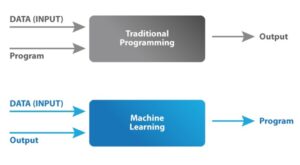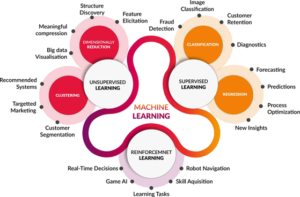
How to Become a Machine Learning Engineer
- Posted by Mohamed Farouk
- On September 18, 2023
What is Machine Learning?
Machine learning is a subfield of artificial intelligence (AI) that focuses on the development of algorithms and models that enable computers to learn from data and make predictions or decisions without being explicitly programmed.

In traditional programming, developers write explicit instructions for the computer to follow. However, in machine learning, the computer learns patterns and relationships directly from data, allowing it to make predictions or take actions based on that learned knowledge. This ability to learn from data and improve performance over time is what sets machine learning apart.

Machine learning algorithms are designed to analyze and interpret large datasets, identify patterns, and make accurate predictions or decisions based on that analysis.
There are various types of Machine Learning algorithms, including supervised learning, unsupervised learning, semi-supervised learning, and reinforcement learning.
Supervised learning involves training a model using labeled data, where the algorithm learns to predict or classify new, unseen data based on the provided labels.
Unsupervised learning deals with unlabeled data and focuses on finding patterns or structures within the data.
Semi-supervised learning combines labeled and unlabeled data.
Reinforcement learning involves training an agent to interact with an environment and learn optimal actions through trial and error.
Machine learning has a wide range of applications across industries. It is used for tasks such as image and speech recognition, natural language processing, recommendation systems, fraud detection, autonomous vehicles, medical diagnosis, and many more. Overall, machine learning is a powerful tool that enables computers to learn from data and make predictions or decisions autonomously. It has the potential to transform industries, enhance decision-making processes, and improve the overall efficiency and effectiveness of various applications.

This guide will now provide you with the necessary roadmap to embark on a fulfilling career in machine learning.
- Develop a Strong Foundation:
To begin your journey as a machine learning engineer, it is crucial to build a strong foundation in mathematics, statistics, and programming. Start by gaining proficiency in linear algebra, calculus, and probability theory. These mathematical concepts form the backbone of machine learning algorithms. Simultaneously, learn programming languages such as Python or R as they are widely used in the machine learning community.
- Acquire Knowledge in Machine Learning Concepts:
Familiarize yourself with the fundamental concepts of machine learning, including supervised and unsupervised learning, regression, classification, clustering, and dimensionality reduction. Understand the intuition behind various algorithms, such as decision trees, support vector machines, neural networks, and ensemble methods. Explore online resources, attend workshops, and enroll in online courses to gain a solid theoretical understanding of these concepts.
- Gain Practical Experience:
Theory alone is insufficient; practical experience is crucial in the field of machine learning. Engage in hands-on projects to apply your knowledge and develop practical skills. Participate in Kaggle competitions, contribute to open-source projects, or work on real-world problems. Building a portfolio of projects will not only demonstrate your abilities to potential employers but also allow you to learn from practical challenges and improve your problem-solving skills.
- Deepen Your Knowledge in Advanced Topics:
As you progress in your journey, dive into more advanced topics within machine learning. Explore deep learning, natural language processing (NLP), computer vision, and reinforcement learning. These subfields have significant applications in areas such as speech recognition, image classification, object detection, and robotics. Stay updated with the latest research papers and attend conferences or webinars to keep up with the rapid advancements in the field.
- Collaborate and Network:
Networking plays a vital role in any career. Engage with the machine learning community by attending meetups, joining online forums, and participating in data science competitions. Connect with professionals and researchers in the field to gain insights, exchange ideas, and explore potential job opportunities. Collaborative projects and mentorship can also enhance your learning experience and expose you to different perspectives.
- Continual Learning and Professional Development:
Machine learning is a rapidly evolving field, and staying up-to-date is crucial for success. Follow influential blogs, read research papers on websites like ResearchGate and Google Scholar, and explore online courses and tutorials. Pursue higher education options, such as master’s or doctoral programs, to deepen your understanding and gain access to cutting-edge research opportunities. Additionally, consider obtaining relevant courses and certifications, such as those offered by reputable organizations like Kaggle, Coursera, EDX, Udacity, AWS, or Microsoft.
Conclusion:
Becoming a machine learning engineer requires dedication, continuous learning, and a passion for solving complex problems. By following these steps, you can lay a solid foundation, gain practical experience, and keep abreast of the latest developments in the field. Embrace the challenges and opportunities that come with this exciting and rewarding career path. Good luck on your journey!




